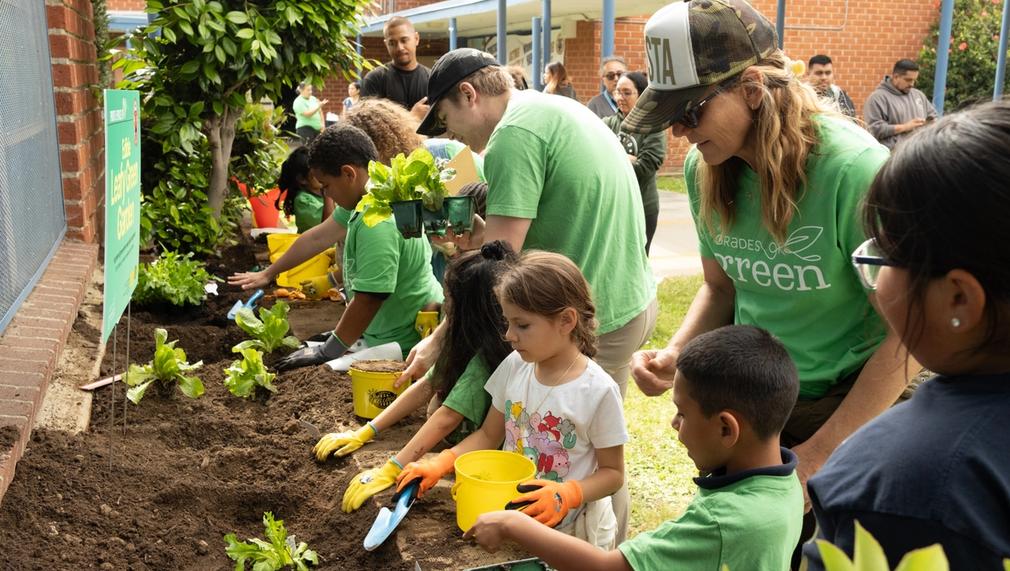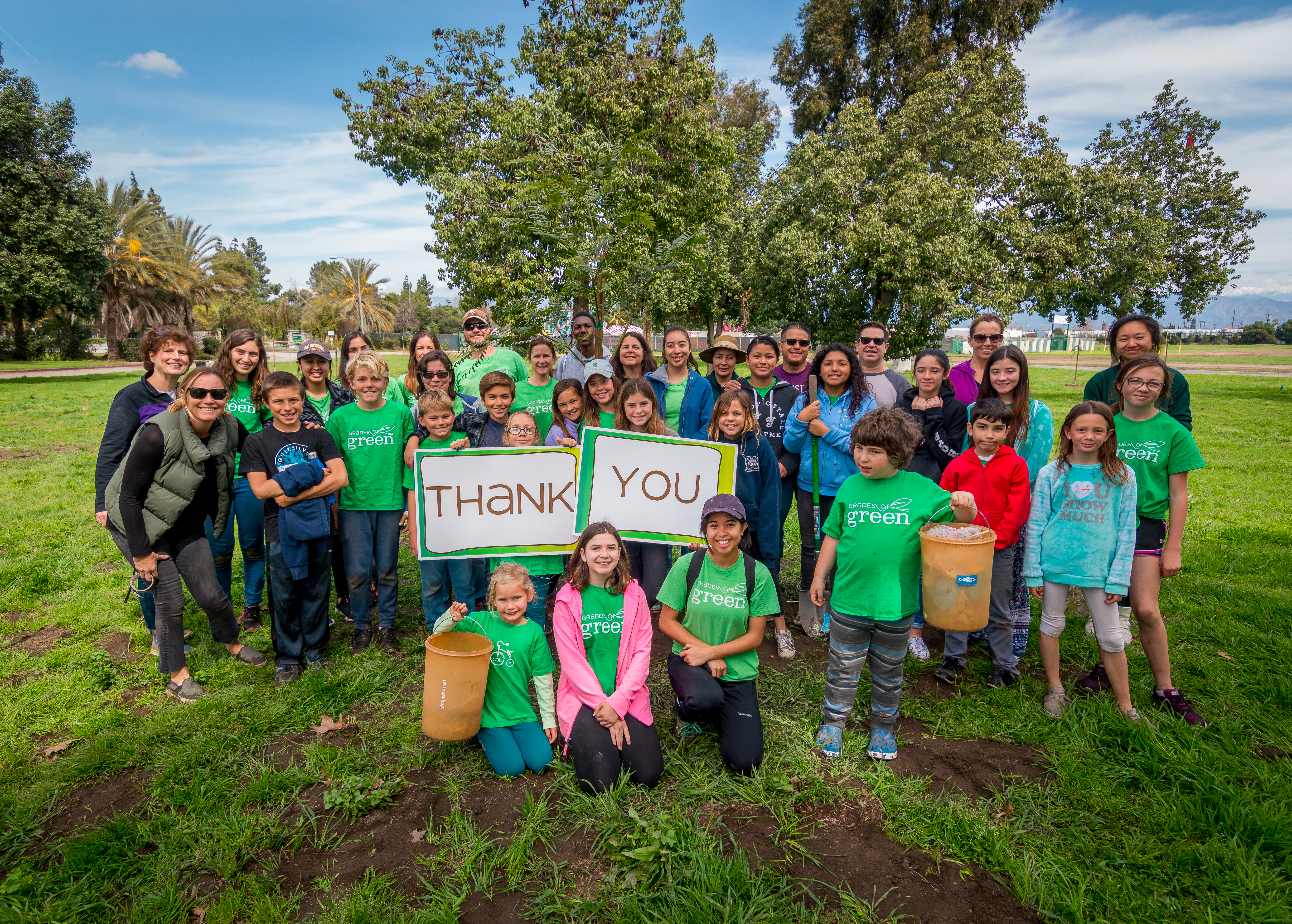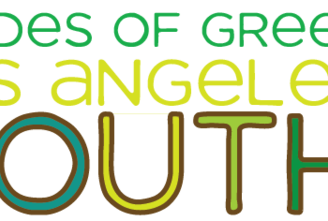Grades of Green
EXPANSION & RECOGNITION
Since our website launched just three years ago on Earth Day 2010, Grades of Green has grown rapidly and expanded internationally with more than 104,000 students in 27 states and four countries enrolled in our programs. Grades of Green has been honored with several awards over the last four years, including the Environmental Protection Agency’s prestigious Environmental Award, a United States Conference of Mayors Award, as well as being instrumental in two Grades of Green schools being designated as “Green Ribbon Schools” by the U.S. Department of Education.
PROGRAM WORK
Through our program work, we have brought and are bringing real environmental change to our communities. Some examples include: helping more than 50 Los Angeles County schools divert over 50,000 bags of trash from local landfills through our Trash Free Lunch Program; helping several California schools districts stop the use of toxic cleaning supplies in their schools; performing a “greening” of 10 underserved schools in the Los Angeles area and helping them set up waste reduction programs, including in-class recycling and lunch-time sorting systems; and assisting several local schools end the use of Styrofoam trays at lunch time. Should we receive one of the LA2050 grants, we look forward to continuing this hands-on program work in the schools within the LAYC.
EMPOWERING OUR YOUTH
While we are proud of the recognition our organization has received and the projects we have led, we believe our most important work is teaching our children that they have the power to make a difference. As noted above, it was Grades of Green students who went to their City Councils in Manhattan Beach and Hermosa Beach to ask for bans of plastic bags and Styrofoam. Inspired by those stories, El Segundo High School students recently went to their City Council to ask that additional recycling containers be placed around town.
Several of our existing Youth Corps students have received national and regional recognition for their environmental efforts, including Grace C and Sam H who were named as Champions for Change by the White House, and Max R and Reese R, who were featured in a Washington Post article about banning Styrofoam.
Other Youth Corps and Grades of Green students are tackling environmental problems big and small at their schools and in their communities. For example, Yaeeun H is using Grades of Green 3R curriculum to teach kids at her school about how and why to protect the environment; Sydney H, a sixth grader, is organizing an e-waste collection drive at her school; Sam H is collecting used shoes to donate to Soles for Souls; and Lauren S and Jenna R, both sixth graders, are working to plant a native garden at their school. These kids are the future of Los Angeles and our best hope of making our vision for Los Angeles a reality in 2050.
Visit this organization’s website to learn more

5 Submitted Ideas
 LEARN ·2025 Grants Challenge
LEARN ·2025 Grants ChallengePathways to Purpose: Virtual Sustainability Internships
Grades of Green’s SOAR Virtual Internship Program will empower Los Angeles high school students—especially those from underserved communities—with the skills, mentorship, and guidance needed to explore sustainability-focused careers. Through partnerships with local corporations and AI-powered tools, the program breaks down systemic barriers, offering students hands-on experience and personalized pathways into high-impact roles across diverse industries promoting environmental sustainability.
 PLAY ·2024 Grants Challenge
PLAY ·2024 Grants ChallengeGrades of Green Students - Planting the Seeds of Change
Grades of Green is transforming communities from the ground up - Educating and empowering students to lead environmental change in their schools and community through tree planting, gardens, composting and food recovery projects.
 PLAY ·2023 Grants Challenge
PLAY ·2023 Grants ChallengeTransforming Communities from the Ground Up
Grades of Green educates and empowers students to take action and lead environmental projects... from the ground up. Creating and caring for green spaces, trees and gardens in schools provides students and community members far reaching educational, environmental, emotional, physical and health benefits for generations to come. Plus, they're fun to play in. Dig in to learn more!
 LIVE ·2022 Grants Challenge
LIVE ·2022 Grants ChallengeStudent Led Change in Environmentally Disadvantaged Communities

Grades of Green provides students with the mentorship, resources and hands-on leadership training they need to discover their passion and turn it into environmental action. Through our free, award winning, innovative program pathway we engage and inspire K-12 grades students to take action and achieve measurable results in their schools and communities today while developing the skills and drive to lead future positive environmental change, to ensure a sustainable and healthy community and planet for generations to come.
- 2013 Grants Challenge
Grades of Green Los Angeles Youth Corps

THE IDEA
Grades of Green, a California based non-profit dedicated to making environmental protection second nature in young minds, proposes to use the LA2050 grant monies to create a Los Angeles Chapter of its Youth Corps (“LAYC”).
An offshoot of Grades of Green’s existing Youth Advisory Board, the LAYC will be Los Angeles based and project-oriented. The LAYC will be made up of teams of three to six students at 10 Los Angeles schools who will work together to implement a Green Project at their school or in their local community in the summer and fall of 2013. The teams can choose to implement one of Grades of Green’s high-impact environmental activities detailed on our website, such as “Trash Free Tuesdays” or “Walk to School Wednesdays,” or an environmental project of their own creation.
THE DETAILS
Using Grades of Green’s extensive school network (169 schools world-wide and growing), our partnerships with Los Angeles area schools, as well as our many media contacts, we will advertise the LAYC beginning this spring and pick 10 school teams to serve on the LAYC. We will make every effort to have at least five of the 10 schools come from underserved areas.
Once the 10 teams are in place, Grades of Green staff will work with the teams to perform environmental assessments at their schools to identify a Green Project that would best suit their schools’ needs. Once the Green Projects have been chosen and signed off on by the school administration, the students will work with Grades of Green to develop an implementation plan. Each team will receive a portion of the grant money to execute its Green Project. Over the summer, Grades of Green will hold an LAYC Orientation Day for the teams to come together, share their ideas and receive training from Grades of Green staff.
Once school starts in the fall, Grades of Green staff will work with the teams to hold a kick-off day at each school and then to roll out their Green Projects. The 10 LAYC teams will have until December 1, 2013 to complete their projects. Once the projects are complete, Grades of Green will hold an LAYC Celebration Night where the teams will share the results of their Green Projects with one another, Grades of Green staff and board members and representatives from LA2050 and the Goldhirsh Foundation. Grades of Green will seek press coverage of the event, as well as of the LAYC, their Green Projects and successes.
THE IMPACT
As detailed in the LA2050 Report, Los Angeles’ Environmental Quality, while improving, still has a long way to go. At Grades of Green, we believe the best way to ensure future environmental sustainability is to make environmental protection second nature in our children. It is our children who will continue the work cleaning up Los Angeles’ air, expanding upon current water conservation efforts and recognizing the importance of providing safe, clean, green outdoor space to all Angelenos. Put simply, it is our children who will get us where we need to be in 2050.
But where can kids learn and become inspired about the importance of protecting the environment? Unfortunately, environmental education is not part of our public schools’ curriculum. This is where Grades of Green comes in. Identifying the need and desire for environmental education and action in schools, yet recognizing the reality of shrinking budgets and limited resources, Grades of Green was founded to bring fun, hands-on environmental education programs into the classroom at no or low cost to schools. Over the last three years, we have brought much-needed environmental education to 169 schools worldwide.
The impact of the LAYC will extend far beyond the benefits each Green Project will bring to the schools and their communities. The participating students will learn first-hand the power of their own actions to make a difference, which will create a ripple effect, inspiring other students, parents, educators, community and business leaders within their greater school communities.
While we anticipate the greatest impact of this program to be on Los Angeles’ long-term Environmental Quality, we also expect impacts across the Education and Social Connectedness Indicators. On the education front, our website provides schools access to over 40 free tools and activities to raise environmental awareness and protect their local environment. Schools have found our environmental education resources a great supplement to their curricula, including programs aligned with California’s Science, Technology, Engineering and Mathematics (STEM) standards. In terms of Social Connectedness, the LAYC will bring kids and communities together from across the city and socio-economic boundaries to share their ideas and experiences. The LAYC will also provide valuable hands-on lessons to the participants and their school communities about the importance of volunteerism and civic engagement.